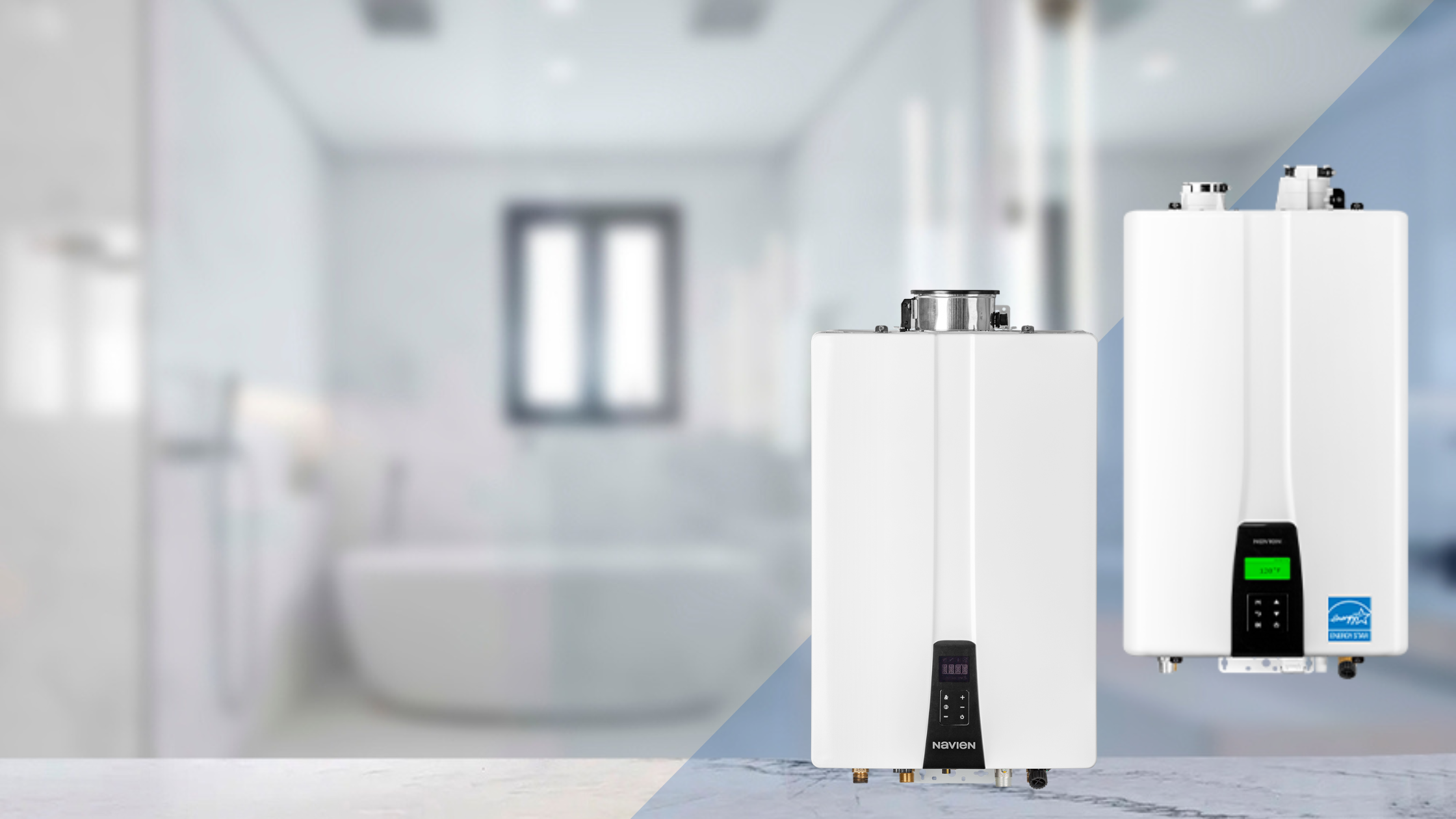High Quality Tankless Water Heaters in Houston
Key Takeaways
- Tankless water heaters heat water on demand for greater energy efficiency
- Benefits of a tankless water heater include energy savings and a compact unit
- Nick’s offers professional installations, repairs, and maintenance in the greater Houston area
Get Fast, Reliable Tankless Water Heater Service From Houston’s Trusted Family-Owned Experts
Looking for a new tankless water heater for your Houston home? Nick’s services the greater Houston area to bring you professional installations, repairs, and maintenance for your water heater. Discover the benefits of a tankless water heater, signs that it’s time for repairs, and why Houston homeowners choose Nick’s for dependable water heater services.
Why Choose Nick’s Plumbing for Tankless Water Heater Services in Houston?
Discover why Houston homeowners count on us for professional tankless water heater services.
Professional solutions
We are knowledgeable and experienced to bring you the best in local water heater solutions. We use quality products so you can feel confident that your repairs will last.
Flexible financing
We’ve partnered with Wells Fargo financing to offer convenient monthly payments, online account management, and more. We also have a range of special offers to help you save on many plumbing and air conditioning services.
Our Tankless Water Heater Services
We offer a range of professional plumbing services in the greater Houston area, including:
Tankless water heater installation
Whether you’re looking for a tankless water heater replacement or adding to a new home, we can help with tankless water heater installations. We carry a range of gas-powered and electric models.
Tankless water heater repair
From inconsistent water temperatures to unusual noises, our pros can address a wide range of tankless water heater repairs. We carry premium parts for longlasting, high-quality repairs.
Tankless water heater maintenance
Annual maintenance checks are the best way to keep your tankless water heater performing its best. We recommend booking with one of our pros at least once a year, or more frequently if your home has hard water and requires sediment clean-out from your plumbing.
How Do I Know If I Need Tankless Water Heater Repair or Replacement?
Worried you might need emergency tankless water heater services? These common problems may indicate it’s time for repairs or replacement:
Inconsistent water temperature
If you’ve noticed issues with water temperature, it may indicate an issue with an internal component such as the heating element.
Leaks
Water on or around your tankless water heater can mean a leak in the system. This may be due to an internal component malfunction, a loose connection, or physical damage that needs to be patched up and resealed.
Loud noises
Tankless water heaters typically have fairly quiet operation, so loud noises are often a sign of an issue. A broken fan, loose part, or buildup of sediment from hard water are common causes of unusual water heater noises.
Age of the system
Tankless water heaters are extremely durable and may last more than 20 years with good maintenance. However, even the best models will eventually show signs of wear. If your tankless water heater is reaching the end of its expected lifespan and requires a major repair, it may be more affordable in the long run to replace it now.
Benefits of Installing a Tankless Water Heater
Discover the benefits of a tankless water heater and schedule your installation today.
Constant hot water
Unlike traditional water heaters, a tankless water heater heats your water on demand. This means a continuous supply of water, so you’ll never have to worry about the shower running cold.
Extended unit lifespan
Most traditional water heaters last between 8 to 12 years, while a tankless water heater may last more than 20.
Energy savings
Tankless water heaters only heat the water that you need, so there’s no energy wasted maintaining the water temperature. Energy Star estimates that a tankless water heater saves a family of four $95 every year in energy efficiency.
How Much Does Tankless Water Heater Service Cost in Houston?
Explore the factors that influence installation costs for electric and gas tankless water heaters.
Units and installation
Purchasing a new tankless water heater and installing it in your Houston home ranges from $4,000 to $8,500 for both the unit and installation. This includes both gas-powered and electric tankless water heaters.
Repairs and replacements
Repair costs typically range from $170 to $450, depending on the severity of the problem. Purchasing new parts may add between $30 to $400 in replacement costs.
Common cost factors
There are a number of factors that impact the cost of your tankless water heater installation, including:
- Brand
- Unit size
- Gas or electric model
- Accessibility of your home
What Size Of Tankless Hot Water Heater Do I Need? 
- A pro finds out how many Btus (British Thermal Units) per
gallon a heater needs to raise the incoming water to 120 degrees. - Next comes peak demand, the sum of the flow rates for
every appliance and fixture that could be using hot water simultaneously (those
rates are listed below). The total gets reduced by 20 percent since we
don’t bathe or wash in 120-degree water. You could also help reduce peak
demand by upgrading to low-flow fixtures and water-saving appliances. Or
by holding off on the washing when the shower is in use. - Calculating the total Btu output is done by plugging the
Btus-per-gallon and peak-demand figures into the formula. If that output
falls between two models, purchase the unit with the higher Btu rating.
And if it exceeds 198,000 Btus, the maximum for residential gas heaters,
you’ll need two smaller tanks that work together.
Rule-of-Thumb Sizing
In case you’re not interested in doing the math. Then you can use these figures to estimate how much heater output you’ll need.
1 bathroom, 1–2 people: 140,000 Btus
2 bathrooms, 2–3 people: 190,000 Btus
3 bathrooms, 3–5 people: 380,000 Btus
Fixture flow rates:
Showerhead: 1.25–2.5 GPM
Kitchen or bath faucet: 1.5–2.2 GPM
Tub filler faucet: 4 GPM
Dishwasher: 1–2.5 GPM
Washing machine: 1.5–3 GPM
To find the actual GPM of any fixture, time how many seconds it takes to fill a bucket to a 1-quart mark. Divide that by 15, the answer will give you your fixture’s GPM.
Do Tankless Water Heaters Need Maintenance?
What Can Go Wrong with My Tankless Water Heater?
A tankless water heater doesn’t have many moving parts to cause mechanical failure, but there are some symptoms to look for that can indicate a need for tankless water heater repair in Houston. The pressure of your hot water may decrease, which suggests that mineral deposits may have built up in your heat exchanger. If these clog-causing deposits are not removed with regular maintenance, they will eventually cause the heat exchanger to corrode. Corrosion of the heat exchanger will cause leaks in your tankless water heater which can then also damage the electronic components of the water heater.
Depending on the type of tankless water heater you have, gas jets and electrical contacts need to be adequately maintained to ensure consistent firing. A failure in the gas supply or electrical circuits can result in a complete loss of hot water.
What Are The Latest Tankless Advances?
Installing Your Tankless Unit Outside
Tankless Water Heaters
What to Expect When You Book Tankless Water Heater Service With Us
Whether you’re looking for a simple consultation or calling for same day tankless water heater repairs, here’s what to expect when you book with us.
Step 1: Schedule free consultation + estimate
When you book a free consultation with us, we’ll discuss your family’s hot water needs.
Step 2: Diagnosis + customized recommendation
Our team will perform an on site inspection and diagnose your water heater issues. We provide a recommendation customized to your unique needs.
Step 3: Expert installation/repair with top-rated parts
Once we’ve found a solution that fits your needs and budget, we’ll conduct professional repairs or installation. We use top-rated parts to ensure the longevity of your water heater repair.
Step 4: Final walkthrough + warranty explanation
After repairs or installation, we’ll do a walkthrough and make sure your tankless water heater is working correctly. We’ll also talk to you about your warranty and any maintenance requirements necessary for warranty validity.
Service Areas — Proudly Serving Houston, TX and Surrounding Zip Codes
Looking for a tankless water heater plumber near you? We’re proud to serve our local Houston community, bringing you a range of great services for your tankless water heater. Explore our service area including plenty of zip codes in Houston and the surrounding area:
- 77002
- 77005
- 77006
- 77007
- 77008
- 77009
- 77018
- 77019
- 77024
- 77027
- 77030
- 77056
Ready to Upgrade or Repair Your Tankless Water Heater? Call Nick’s Plumbing Today!
Discover the benefits of a residential tankless water heater for your Houston home! We serve Houston and the surrounding area with professional water heater installations, repairs, and maintenance. Contact us today to book your free consultation and discover the comfort, convenience, and savings of a tankless water heater.
Frequently Asked Questions
How do you reset a tankless water heater?
Turn off the power at the breaker, wait a moment, and then turn it back on or press the reset button located on the water heater. Exact locations vary by model, so try inspecting the top, sides, and back of the unit and control panel to find the power button.
How long does it take to install a tankless water heater?
A typical new tankless water heater install takes about three hours. If you’re replacing a tanked system, expect closer to five hours, including removal and installation.
What size tankless water heater do I need for my Houston home?
Finding the right size of tankless water heater depends on the number of people in your home, the number of water-use appliances, and your typical hot water habits. A professional plumber can help you estimate your water needs and help you select the right size and model.
























